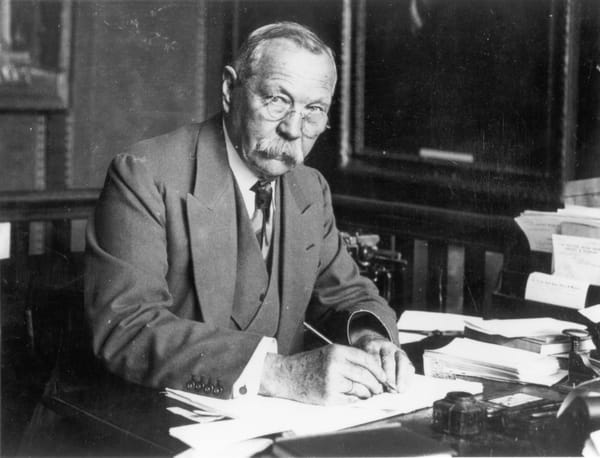Note 53: Surviving my first (baby) Seldon Crisis
It's time to become something new.
As I mentioned in last week’s Note, I found myself in a bit of a cash crunch for the past month or so, but I didn’t get too much into the details. Now that the crunch is over and the situation is resolved, I figured a debriefing might be in order so I can serve as an effective cautionary tale.
To recap, my primary and sole source of income for the past half decade is my software consulting company, Audacious Software. I’m the only full-time member of that company, though I’ve been working with a couple of contractors over the years to help me out. As an ongoing single-member LLC, I’m required to file quarterly taxes, which ate up most of my reserves last month. Furthermore, because I’m terrible at paperwork, I’ve also been on an extension for filing my taxes that would expire on October 15th. I didn’t owe any taxes, but I did need to verify that I made all my contributions to my Simplified Employee Pension (SEP) IRA by that deadline.
A SEP IRA is basically a 401(k) or 403(b) retirement plan for self-employed folks and small companies. The law basically allows me to set aside a part of my earnings in a pre-tax manner that lowers my overall taxable income for reporting purposes. (Just like a 401(k) plan, what I deduct during retirement is taxed as income at that time.) Due to some projects that went a bit over-budget last year (the joys of working in a primarily grant-based economy), I’ve been robbing Peter to pay Paul to keep the financial ship afloat. The biggest culprit was a large-scale social media addiction study that yielded some decent results, but generated some sizeable Amazon bills the last two years as we attempted to scale my Passive Data Kit platform from a couple hundred research participants to ten thousand. We eventually figured out the scaling solution, but paid a lot of “tuition” along the way.
This last week was basically my do-or-die moment, and one that I largely had little control over. I had billed plenty of hours to pay for the SEP IRA contribution (I maxed it out at 25% of my 2020 income) but the problem was that the checks I was expecting were coming in much later than they had earlier in the year. As described in last week’s Note, I chalk it up to my clients (universities) having issues scaling back up to in-person learning after losing a lot of staff over the pandemic. Now, one silver lining to the loss of staff is that most of my clients have automated the payment process, so in the past where I would be waiting for a physical check to run over to the bank (an especially perilous place to be given recent US Postal Service issues), most of my payments now are electronic deposits via ACH. And the way last week unfolded, I received the necessary funds literally in the final hours before my deadline. One ACH payment cleared on Thursday, two cleared on Friday, and I received a paper check Friday afternoon that I was able to deposit and make the final contribution to the SEP IRA.
Waiting all last week for funds to come through was excruciating. I’m a fellow who deals with stress by putting my head down and doing something directly to address the cause of the stress, and in this case, there was literally nothing I could do but wait. It was a very productive week work-wise, because I hammered away at other billable projects so that I could produce another large month of funds to start chipping away at the debt I accrued while waiting for payments AND there wasn’t really a lot of joy to be found in other distractions while I was grappling with the potential business outcomes had I failed to meet the deadline. Since Friday, I’ve been slowly returning to normal after making it through the ordeal and getting back to my old chipper self.
Since Apple TV is currently in the middle of their Foundation first season, this experience reminded me of the Seldon Crises that shape the outcome of the storyline in the first Foundation book. In that volume, a Seldon Crisis is introduced as a historical inflection point predicted by Hari Seldon when he laid out his plans for the eponymous Foundation. It’s a recognition that things can’t continue as they have been, and people either need to react and change to adapt to the new reality that’s snuck up on them, or become passive victims to historical currents.

In the first book, the first Seldon Crisis happens when the encyclopedists at the Foundation realize that they are not actually collecting and curating knowledge for a distant Empire to reduce the unavoidable Dark Age from its collapse, but rather they are collecting that human knowledge to become a galactic power in their own right, independent of the Empire. (I’m not current on the TV show, so I don’t know if this is a spoiler or not, given some of the other liberties the show’s taken.) The first Seldon Crisis reveals that the Foundation wasn’t set up to produce an encyclopedia, but rather to become the new power center that pulls the galaxy out of darkness itself (eventually).
On a smaller scale, the past month has revealed a similar kind of inflection point. Audacious Software can no longer be just me puttering away working on a handful of research projects for a handful of professors, and it really hasn’t been that for some time, if I’m honest with myself. To illustrate that point, on the same Friday where I’m waiting for checks to come in and ACH payments to clear, two book chapters on new ways to study social media use were submitted to SAGE Publications to be part of an upcoming edition of The SAGE Handbook of Social Media Research Methods. Those two chapters were not about refinements to existing methods or processes, but entirely new methods for gathering data that I invented with my academic research partners in the past decade.
On that same day, I had a productive call with another addiction researcher working at an Ivy League institution who wanted a quote and timeline from me for building an app to help study alcoholism. And rather than give them a quote for the app that they asked for, I was able to suggest a more robust and efficient method for collecting the information they needed using homegrown technologies that’s part of my stable of tools that didn’t exist before. And I’m in the middle of arranging an impromptu academic conference among my clients later this year so that I can network them together in ways that wouldn’t happen given their narrow academic focuses. I’ve always claimed that I wanted to be a research “force multiplier”, and here I am now.
It’s now time to figure out what all this becomes post-Crisis.
Rocket stonks
Now that I’ve contributed a quarter of last year’s earnings to my SEP IRA, I have some funds to invest. My traditional approach is to put most of those earnings into a low-load index fund (I’m a fan of Vanguard’s S&P 500 funds), and save a little “play money” for individual investments in companies that excite me. For those keeping track at home, in the “space” sector, I’m currently invested in
- Rocket Lab (RKLB): The clear runner-up to SpaceX’s private space dominance. Rather than try and out do SpaceX at their own game, RKLB has been acquiring other space-focused companies to build out a diversified portfolio of services not only for folks looking to launch stuff into orbit, but to build other rockets, satellites, and spacecraft.
- Astra Space (ASTR): An aspiring small-rocket launcher who infamously had their latest launch “moonwalk” when one of the engines shut down and the flight control software impressively kept the rocket pointing in the right direction, and managed to launch through MaxQ before being destroyed for veering off the flight plan.
- Virgin Orbital (NGCA/NGCAU): Another smaller launch company that uses an approach that piggy-backs off a jet hoisting the rocket as high as it can before launching properly. This is still a SPAC stock, and pre-merger, so there’s a non-zero chance that investors will change their mind.
- Procure Space ETF (UFO): This is basically an actively-managed space mutual fund covering a variety of companies with skin in the space game.
- Nokia (NOK): While largely still a terrestrial company, I added this to my portfolio after the announcement that they’ve contracted with NASA to build the Moon’s first LTE network (which may be obsolete before it’s deployed if Musk can deploy a Starlink network around the Moon first).
So, what’s new in this portfolio? The major move I made last week was to almost double my holdings of RKLB mainly on the basis that it’s undervalued if SpaceX can command a valuation of over $100 billion, and RKLB is sitting around a $6 billion market cap. I also feel that the company is executing on its post-SPAC IPO very cannily, and the current price is a steal. Of course, after I executed the trade on Friday, the market sent it down a little more than 5%, so my intraday timing could have been a bit better. (To compound the sting, I held off on buying my boring index funds at the same time, and missed out on some decent gains on the S&P 500.)
In terms of overall performance, the Procure Space ETF, Nokia, and Virgin Orbital have been hovering pretty consistently around the same price they’ve been for months, so not a lot of movement there.
After their last failed launch in August, Astra’s been severely hammered, but we saw some light at the end of the tunnel this week with the announcement of the reasons for the last launch’s failure, and a new launch happening in the next two weeks or so for the next launch. That provided a decent mid-week bump that came back down to earth by Friday. (Let’s hope the next launch doesn’t follow a similar trajectory.)
Rocket Lab has been a bit of a roller-coaster ride, enjoying September highs around $20 per share, before settling down (with some smaller bumps) to the current price in the high $12s. As I mentioned above, I feel like it is undervalued relative to SpaceX, so I’m not sweating the instant loss I suffered from Friday’s purchase. It’s exceedingly clear to me that “space” won’t be a winner-takes-all market with SpaceX monopolizing access, and there will be plenty of niches and dual-sourcing opportunities for Rocket Lab, even if it ends up playing Pepsi to Musk’s Coke.
Overall, I’m down about 6.8% across the total portfolio. The highest performing elements are Nokia and the Procure Space ETF with gains around 70%, a 4% profit from Rocket Lab (even at the current distressed prices), and Virgin Orbit hovering just above what I spent on it. The big loser here is Astra with around a 34% loss across my purchases thus far, and these losses are what’s pulling the rest of the portfolio down. If Astra can pull off the LV0007 launch later this month, I expect investors to give the company another good look and send it back into profitable status for me.
In terms of funds I’m holding back, I’m still waiting to see when Relativity Space becomes something I can purchase, as that’s really the last missing piece of the puzzle I’m trying to assemble.
“Someone’s wrong on the Internet!” (Political edition)
Online, I’ve been following two discussions and interjecting my opinion in the comment boxes and discussion boards that let me.
The first discussion was started earlier this week by Jonah Goldberg over at The Dispatch. (I have some short term Dispatch subscriptions I can give away if you’d like one - leave a comment and I’ll hook you up.) He argued that there’s no fixing the GOP and its fixation with Trump and Election Trutherism from within, and that a third-party solution is the answer. As someone who votes third party* as often than I vote for the mainstream parties - Libertarian Party 2000/2012 + McMullen 2016 vs. Democratic 2004/2008/2020 (2008 should have been a McCain GOP vote until Sarah Palin) - I’m generally positive towards the smaller parties, but have largely mentally shelved them since Trump and his GOP takeover.
(* Note that since Illinois is a Democratic fortress, I’m a bit freer with my third party votes than I would be in a swing state. In a swing state, Romney would have likely earned my 2012 vote and McCain would have earned my 2008 vote if he didn’t bork his VP choice in the general and demonstrate that he was unfit to handle the Great Recession in the waning days of the election.)
I like Goldberg’s suggestion that a third-party of anti-Trump/Election Truther conservatives operate not to field candidates, but to become a holding pen for conservatives and moderates who aren’t on-board with the general Democratic program, but refuse to support the aims of the insurrectionists. The idea is that party would endorse candidates who step off the Trump train and demonstrate that first (and most importantly) that they want nothing to do empowering anyone other than the voters to decide who wins elections (no legislatures with BS “audits”, governors declaring duly-selected electoral slates invalid, etc.). Conservative and small gov’t candidates that followed the new party’s line would enjoy an advantage for those votes, instead of them going automatically to their Democratic opponents.
Unfortunately, the reason that this conversation is necessary is because Democrats have shown themselves uninterested in seriously addressing the root cause (shoring up our institutions with LAWS to prevent the same kinds of nonsense from Trump v2.0), and are more interested in driving the nation into debt by raiding the policy liquor cabinet before they likely lose legislative power in 2022. They are not erecting legal walls and guardrails that make things like the Eastman memo dead on arrival. Beyond the Afghanistan surrender and retreat, failing to deal with our border issues, and spending like baby Trumps, Democrats’ failing to reinforce our damaged foundations will be the blackest mark on their legacy during this period.
The second discussion I’ve been jumping in on is over at Rod Dreher’s blog at The American Conservative. I enjoy Dreher as a writer when he’s writing about the intersection of faith and politics (even if I don’t agree with his takes on a lot of stuff), but I give him tremendous credit for being one of the first pundits to take COVID seriously in late 2019 and early 2020, weeks and months before anyone else I was reading. Throughout 2020, he was a reliable voice advising people to do the right thing and pushing back against the COVID denialists on the Right.
However, in late 2021, Dreher’s turned into an anti-anti-COVID denialist, arguing against common sense (and in his particular context, I’d include Common Good) measures like vaccine mandates to get the rest of the population protected against the virus. He claims to be “pro-vaccine”, but keeps advancing the position that since the medical sector isn’t being straight with patients when it comes to hot topics like transgenderism, why should we trust what it tells us about vaccines? (Note that he was eagerly vaccinated himself.)
He’s also highlighted COVID denialists in the DOE national laboratory system as courageous resisters of a corrupt (Biden) regime. As someone who spent time as an employee at Los Alamos National Laboratory (the summers before my freshman and sophomore years of college, developing computer science curriculum for NM high school teachers), I have enough familiarity with how the system works to point out that having a Q-cleared staff member working on nuclear non-proliferation working from home because of a refusal to take the vaccine on nebulous “religious” grounds (the refuseniks’ own churches don’t support their reasoning on doctrinal grounds) isn’t the “soft totalitarianism” that Dreher sees behind every corner and shadow, but a workplace enacting reasonable policies for workers that must collaborate face-to-face (by virtue of the sensitive work they do and the physical protections to protect that work from state-level actors).
It’s been dispiriting to see 2021 Dreher become the kind of fellow that 2020 Dreher railed against, and I’ve been active in the comments trying to see if we can hear about what’s changed in the intervening period. Does nuDreher have some new reason to think that he’s being lied to about the vaccines other than his objection to transgender medical procedures? Or is this a case of FYIGM, where nuDreher isn’t in danger (because of his shot), so there’s less urgency in pushing people to do the right thing? Or have sales of his Live Not By Lies stalled, and he sees a market in twisting his message to confirm COVID denialists’ beliefs in order to sell a few more books? He’s not telling, so I keep pushing when given an opening.
And that’s who I’ve been arguing with online these past couple of weeks.
Interesting reads
Astra explains previous failure, sets October date for next launch attempt (Ars Technica)
NASA’s Lucy mission will soon be in the sky, with a launch set for Saturday (Ars Technica)
This Note is already getting long with my meandering, so I’ll cut it short here. (I also have a lot of other work to do this afternoon, including launching a new Patreon.) I promise next week we’ll get back to book reviews and more interesting topics. So, stay tuned, CMDRs.
o7



